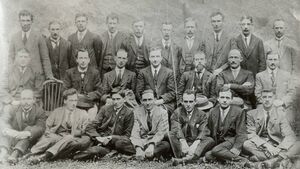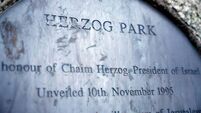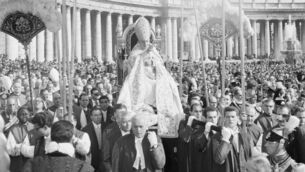All politics is local... and always has been

Members of Sligo County Council in 1920 after Sinn Féin swept the local elections. Back row, from left: Seamus Devins, JJ Mullarkey, Jim Hunt, Tom O'Donnell, Bernard Conlon, M. Gray, PJ Rooney, D. Leonard, Laurence McHugh, James Gilligan. Middle row: John Lynch, Thomas Murricane, Alex McCabe, JJ Clancy, Sean McMorrow, John Hennigan, D.M. Hanley. Front row: Dan Kilcullen, Seamus McGowan, Harry Cavanagh, Jack Brennan, Frank O'Beirne, Michael J. Marren, Michael Finn. The vacant chair was for Frank Carty, then in Sligo Jail.
I came across the above saying while researching this article. It dates from the late 19th century. I feel it reflects the nature of politics everywhere, and always. Here in the Ox Mountains, we will hear plenty of election promises in the coming days.
Let us have a look at the definition of politics, to see if something has been missed since the time politics was first defined. The Oxford dictionary gives two explanations; firstly, the activities associated with the governance of a country or area, especially the debate between parties having power and secondly, activities aimed at improving someone's status or increasing power within an organisation. Interesting.
Egyptians, Romans, and the Greeks were the first people known to have explicitly formulated a political philosophy and to have rational political institutions. Prior to this, states were loosely formed based on religious myths.
Several important political innovations came from the Greeks and the Romans. The Greeks, before the 4th century, granted citizenship rights to their free population. In Athens, these rights were combined with a directly democratic form of government that was to have long-lasting effects right up to this very day, in fact.
The Peace of Westphalia (1648) is considered by political scientists to be the beginning of the modern international system, in which external powers should avoid interfering in another country's domestic affairs. The principle of non-interference in other countries' domestic affairs was laid out in the mid-18th century by Swiss jurist Emer de Vattel. States became the primary institutional agents in an interstate system of relations. Today, in Gaza and Ukraine, we can easily see what happens when these basics are ignored.
Information provided on our own Oireachtas website, , takes us from the first Irish parliament in 1264, right up to the first Dáil in 1919.
The Normans, who began to settle in Ireland in 1169, were the first to give Ireland a centralised administration. The first Irish Parliament for which there is a definitive record met on June 18, 1264. Following the French Revolution and the Irish Revolution of 1798, the Government in London wanted to bring Ireland under its direct control. It persuaded the Irish Parliament to pass the 1800 Act of Union, effectively voting itself out of existence. The Irish Parliament came to an end in 1801.
After the Easter Rising of 1916, and the executions that followed it, public opinion in Ireland turned against the British crown. In the 1918 general election, Sinn Féin, the nationalist party, won 73 of 105 Irish seats in the House of Commons. However, Sinn Féin had pledged not to sit in Westminster but to create an independent assembly in Ireland.
The party made good on its promise by inviting all elected Irish representatives to attend a parliamentary assembly in Dublin. On January 21, 1919, the first Dáil met in the Round Room of the Mansion House. Many Sinn Féin members were listed as “ar díbirt ag Gallaibh” (banished by foreigners) or “fé ghlas ag Gallaibh” (imprisoned by foreigners). Among these was Countess de Markievicz, who was imprisoned in Holloway Prison, London.
They say all politics is local and given that all of us who vote are ‘local’, the theory would seem to be valid. Even in today’s world of global news and instant media, our vote is always for the local candidate, as both the electorate and the candidate keep an eye on each other to gain advantage. After all, what village would not like to have its own councillor and what town would not like to have its own TD.
If you thought that it was only in recent times that political figures had to ship abuse from keyboard warriors, you would be mistaken. In the past there were also writing desk warriors; those who gave vent to their political opinions through the letters' sections in their local newspaper. These ‘warriors’ were no less restrained than the social media bandits of today.
While doing research on this subject, I was drawn to a headline that appeared in the in 1899 about the Aclare and Cloonacool County Council Election. The incumbent councillor was a namesake of my own, Henry McCarrick, of Cloonbarry House, near Aclare. McCarrick, who was seeking re-election, seemed to be liked and disliked in equal measure by people in the various parts of his electoral division, depending on whether they came from Aclare or Cloonacool.
"The chief objection to my mind is that Mr M'Carrick is the representative of a class which has ground the people of Ireland for centuries," wrote one contributor named 'Vigilant'.
Another letter-writer, named 'Cloonacool', opined: "In the many letters you have published about the coming elections, the strongest point is that all applications for county works made by a landlord like M’Carrick should be rejected by the Nationalists of the County Council. This would mean a loss of over a thousand pounds in the year to the district; and as the election holds for three years, the patriots of Aclare and Kilmactigue will have plenty of time to cry over their choice. However, let the Nationalists of County Sligo know that the men of Cloonacool are not in favour of M’Carrick, and it will be in spite of us if he is returned."
Much further back in time, in August 1837, two agents who were travelling to an election event in the town of Sligo, were attacked by a large mob at Cloonacool. The takes up the story.
Allen subsequent died of his injuries. It was also reported at the time that the Cloonacool mob was led by the local priest. I am also led to believe that two on my own ancestors were part of the same mob. Both men subsequently hurriedly left for America although no one was ever convicted in connection with the incident.
While not making light of this tragic tale, it should be said that all election candidates and their supporters are welcomed in Cloonacool today. Oh, and by the way… please use your vote.





